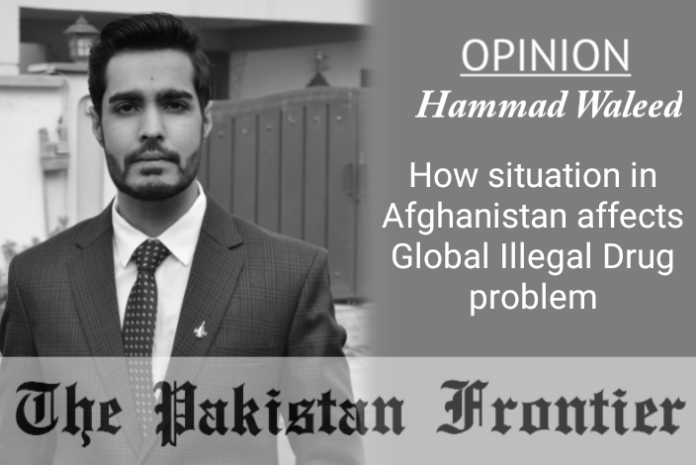Afghan militant groups were notorious for managing their funds through illegal drug trade. The 2018 SIGAR report states that nearly 60 percent of Taliban funding came from drugs. Many of these drugs made their way to civilian Afghans. In absence of any awareness or rehabilitation program, Afghan urban and rural centers have a huge number of drug addicts. Since the Taliban have come to power, no notable step has been taken against Drug trade. Furthermore, the economic crisis might worsen drug usage as well as smuggling, now that Taliban (who survived on drug money against ISAF and ANA) are in power.
The newly formed Taliban health ministry at its inception stated its resolve to combat the widespread drug problem. Afghanistan’s economy and unrest are inextricably linked to the illicit opium trade. The Taliban’s rural constituency includes poppy producers, who rely on the harvest to make ends meet.
With rampant poverty and minimal law enforcement, Afghanistan could become the hub of illicit drug trade and the vices that accompany it. This drug trade can cross threshold of borders into neighboring Central Asian Republics and South Asian states.
The issue eventually lands in security dimension as most of the black money earned from drugs is used by militant groups, provided Taliban’s precedence of surviving on drug major during all these years.
Any new emerging drug trafficking would be carried out through Asia to Europe. Many drugs from Afghanistan are smuggled over to Europe through states constituting the so-called Golden Crescent.
If viewed in the context of increased substance use in the COVID-19 Pandemic, the problem worsens as it indicates an increasing number of individuals resorting to use of illegal drugs to manage mental health issues and distress caused by the Pandemic. Recreational activities that discourage drug abuse, like physical activity and social interactions, haven’t been as safe to engage in or easy to access
People who use substances may have also started new drugs if their usual substances became more difficult to access. This only adds to the huge economy of illegal drug trafficking as demands increase, and provided the restrictions in developed states to grow or manufacture such substances, it leaves uncontrolled regions like Afghanistan and others where law enforcement is minimal, to grow and smuggle these drugs.
Pandemic has globally observed rise in usage of illegal recreational drugs, meaning a multi-billion dollar market is available to be exploited. As a result of the pandemic’s consequence in form of economic hardships, illicit drug production is anticipated to become more tempting to vulnerable rural populations.
This provides just one of the many insights into how Afghan Humanitarian crisis, which is being overlooked by regional and global actors, could create a whole plethora of problems ranging from drug trades, militancy, terror-cartel nexus, human exploitation and the list goes on. This calls for global community to unite and remove hurdles for Afghanistan, especially de sanctioning the 10 Billion reserves. Otherwise it is a disaster in creation and would have detrimental affects on neighboring states and those beyond the region.
About the Author
Hammad Waleed is a student of International Relations in Islamabad. His interests include discourse analysis, Foreign policy analysis, South Asian affairs, Military and Strategic affairs. He can be reached at [email protected]
